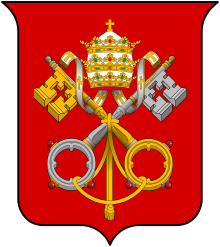Pontifical Council for Promoting Christian Unity
The Pontifical Council for Promoting Christian Unity (PCPCU) is a pontifical council whose origins are associated with the Second Vatican Council which met intermittently from 1962 to 1965.
| Part of a series on the |
| Roman Curia |
|---|
 |
|
Secretariats |
|
Other dicasteries |
|
Tribunals |
|
Pontifical committees |
|
Offices |
|
Institutes |
|
Related topics |
|
|
Pope John XXIII wanted the Catholic Church to engage in the contemporary ecumenical movement. He established a Secretariat for Promoting Christian Unity on 5 June 1960 as one of the preparatory commissions for the council, and appointed Cardinal Augustin Bea as its first president. The secretariat invited other churches and world communions to send observers to the council.
Description
The Secretariat for Promoting Christian Unity prepared and presented a number of documents to the council:
- Ecumenism (Unitatis redintegratio);
- Non-Christian religions (Nostra aetate);
- Religious liberty (Dignitatis humanae);
- With the doctrinal commission, the Dogmatic Constitution on Divine Revelation (Dei verbum).
Following the Second Vatican Council, in 1966 Pope Paul VI confirmed the Secretariat for Promoting Christian Unity as a permanent dicastery of the Holy See.
In the apostolic constitution Pastor bonus (28 June 1988), Pope John Paul II renamed the secretariat the Pontifical Council for Promoting Christian Unity.
The PCPCU has two sections dealing with:
- The Eastern Churches - The Eastern and Oriental Orthodox Churches as well as the Assyrian Church of the East;
- The Western Churches and Ecclesial Communities and for the World Council of Churches.
Purpose
The council has a twofold role:
- The promotion within the Catholic Church of an authentic ecumenical spirit according to the conciliar decree Unitatis Redintegratio;
- To develop dialogue and collaboration with the other churches and world communions.
Since its creation, it has also established a cordial cooperation with the World Council of Churches (WCC). Twelve Catholic theologians have been members of the Faith and Order Commission since 1968.
The PCPCU is responsible for naming Catholic observers at various ecumenical gatherings and in its turn invites observers or "fraternal delegates" of other churches or ecclesial communities to major events of the Catholic Church.
At present, the PCPCU is engaged in an international theological dialogue with each of the following churches and world communions:
- The Assyrian Church of the East[1]
- The Eastern Orthodox Church;
- The Oriental Orthodox churches;
- The Malankara Orthodox Syrian Church;
- The Anglican Communion;
- The International Lutheran Council;[2][3][4]
- The Lutheran World Federation;
- The World Alliance of Reformed Churches;
- The World Methodist Council;
- The Baptist World Alliance;
- The Christian Church (Disciples of Christ);
- The World Evangelical Alliance;
- Some Pentecostal groups.
Structure
Directed by a Cardinal President, assisted by a Secretary, a Joint Secretary, and an Under-Secretary.
- President: Kurt Koch, 2010–
- Secretary: Brian Farrell, 2002–
- Under-Secretary: Andrea Palmieri
Presidents
- Augustin Bea (6 Jun 1960 Appointed – 16 Nov 1968 Died)
- Johannes Willebrands (12 Apr 1969 Appointed – 12 Dec 1989 Retired)
- Edward Cassidy (12 Dec 1989 Appointed – 3 Mar 2001 Retired)
- Walter Kasper (3 Mar 2001 Appointed – 1 Jul 2010 Retired)
- Kurt Koch (1 Jul 2010 Appointed – )
Secretaries
- Johannes Willebrands (28 Jun 1960 – 12 Apr 1969)
- Jean Jérôme Hamer (12 Apr 1969 to 14 Jun 1973)
- Pierre François Marie Joseph Duprey, M. Afr. † (25 Apr 1983 – 16 Mar 1999)
- Jean-Claude Périsset (16 Nov 1996 to 12 Nov 1998)
- Walter Kasper (16 Mar 1999 3 Mar 2001)
- Marc Ouellet (3 Mar 2001 to 15 Nov 2002)
- Brian Farrell, L.C. (19 Dec 2002–present)
The Bible
The council is responsible for working with other churches on ecumenical translations of scripture, and promoted the establishment of the Catholic Biblical Federation.
Relations with the Jews
The Commission of the Holy See for Religious Relations with the Jews is the responsibility of the PCPCU, while the Commission of the Holy See for Religious Relations with Muslims comes under the direction of the Pontifical Council for Interreligious Dialogue. This is because when the council was being created the Commission of the Holy See for Religious Relations with the Jews was consulted as to whether it wished to come under the Inter-Religious Dialogue Council, it declined and thus remains part of the Promoting Christian Unity Council.
See also
References
- "The Holy See - The Roman Curia - Pontifical Councils - Pontifical Council for Promoting Christian Unity". www.vatican.va. Retrieved 2017-11-25.
- "Roman Catholic Church and International Lutheran Council to begin dialogue". Canadianlutheran.ca. 21 November 2013. Retrieved 25 October 2017.
- "Pontifical Council for Promoting Christian Unity (PCPCU) and the International Lutheran Council (ILC) to Hold Informal International Dialogue - International Lutheran Council". Ilc-online.org. 19 November 2013. Retrieved 25 October 2017.
- "A New (Confessional) Direction in Catholic-Lutheran Dialogue - Mathew Block". Firstthings.com. Retrieved 25 October 2017.